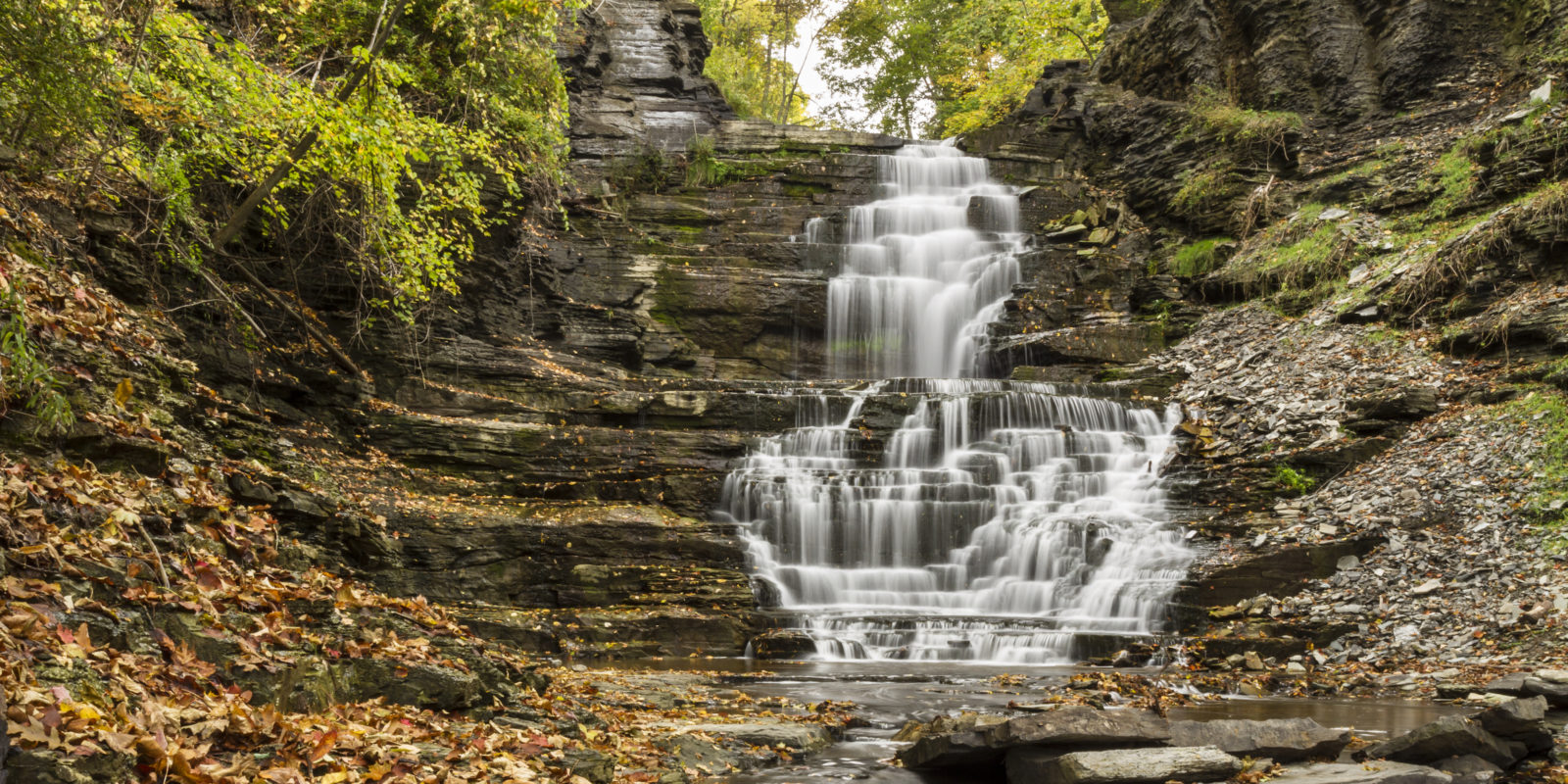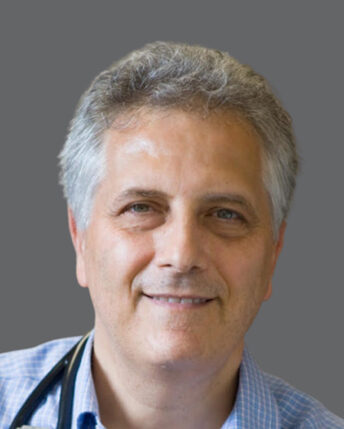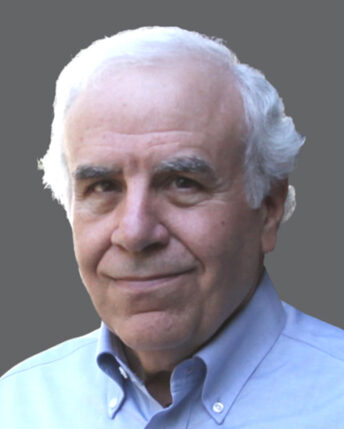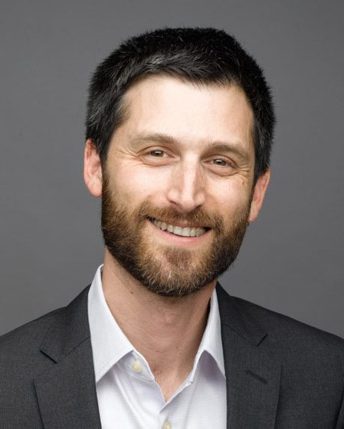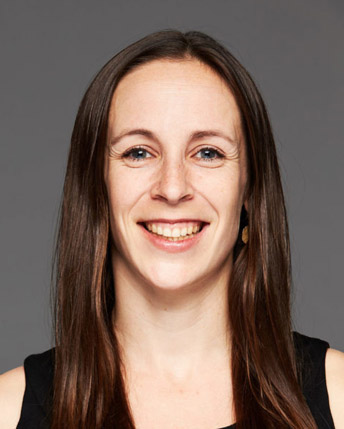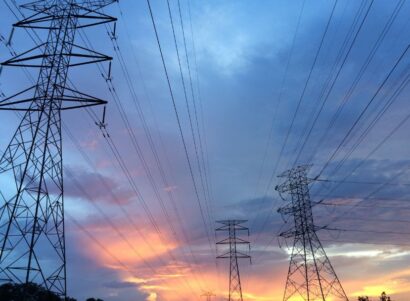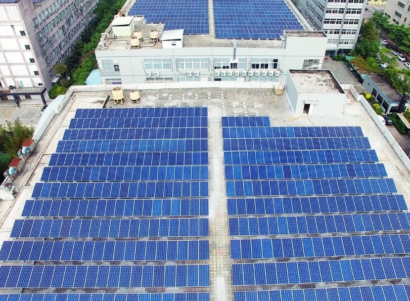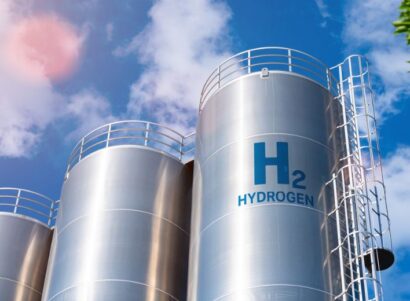Above: Giant’s Staircase waterfall in Cascadilla Gorge on the Cornell University campus in Autumn in Ithaca, New York. Photo by Lightphoto/iStock.
PSE: A Birth Story
A volatile time yields a search for reliable science
It was 2008, and shale gas development had taken Pennsylvania by storm. Residents of Upstate New York were vigilantly tracking the expansion of hydraulic fracturing, known as fracking, as it approached their border, where New York’s portion of the region’s giant Marcellus Shale formation was said to house enough natural gas for 45 years of power generation. The state’s march to development seemed inevitable.
Residents, many of whom were low-income people in economically depressed rural areas, talked of becoming “shallionaires” from selling the drilling rights to their land. Other locals worried about water contamination and methane gas leaks from the drilling operations, which send water, sand, and chemicals down wells at pressures high enough to break up the rock and extract the gas. Energy companies positioned themselves as helping communities with the so-called clean natural gas and an infusion of money. None of the players in the dispute — anti-fracking activists, oil and gas companies, community members — could back up their positions with peer-reviewed scientific information because very little existed.
PSE Healthy Energy was born into — and out of — this charged environment. The organization’s formation has a novelistic arc, with threads coming together in a moment of crisis that threatened to irretrievably change the landscape of the scenic region and the health of its people.
A SLEEPY COLLEGE TOWN WAKES UP
In 2009, Ithaca endocrinologist Dr. Adam Law started noticing signs with the word “frack” with a line through it. “At first I didn’t know what that was,” says Law, a clinical professor at Weill Cornell Medical College, who also has an independent practice. But his teenage son, who’d started volunteering at an environmental organization, filled him in. And Law’s patients started asking questions: “You’re an endocrinologist. . . how will fracking affect the hormone system?” He set about learning.
“It was a long ramp up — so much to learn about engineering, environmental science, and the public health field,” says Law. “The literature on shale gas at that time consisted of five or six papers — that was it.” But he absorbed everything he could find and began giving public talks combining his professional expertise with what he’d learned. What are endocrine disrupting chemicals? What is fracking? How might the two be related?
Dr. Adam Law
“What people want to know about is: How does it work? What will be the consequences to the Earth, and what will be the consequences to human health? Those were the three big issues we were trying to address individually,” PSE co-founder Anthony Ingraffea.
At the same time, Anthony Ingraffea, a Cornell professor of civil engineering who specializes in structural engineering and fracture mechanics, was watching with worry as the Marcellus Shale development headed toward New York. “I knew things from my experience working in the oil and gas industry that this was not going to turn out well,” he says. An industry consultant for more than two decades, Ingraffea knew that getting gas from shale was much more complicated that getting oil or gas from traditional rocks. Modern high-volume hydraulic fracturing is a large, industrial process, and data at the time suggested there was a significant risk that greenhouse gases and other chemicals such as benzene could migrate to nearby aquifers and the atmosphere. He, too, started giving public presentations to local communities hungry for reliable scientific information.
Two other key players emerged. Stan Scobie was a recently retired University of Binghamton psychology professor whom Ingraffea describes as possessing “unparalleled political knowledge regarding the inner workings of New York’s state capital, Albany.” Robert Howarth, a Cornell professor of ecology and environmental biology, conducted research on methane emissions and water quality issues as a result of shale gas development, and his findings had him deeply concerned about Marcellus Shale development from its beginnings in Pennsylvania.
Thanks to pollination from an Ithaca resident who had met all of them at various public forums, the physician, the scientist, the engineer, and the policy expert gradually learned of each other’s aligned efforts. Side conversations among the group led to a fateful meeting on May 13, 2010, when they came together over an informal supper at Law’s home.
A ‘SACRED COUCH’; A BOARD OF DIRECTORS
The agenda for the evening included a discussion of whether one organization or two was needed, and reviewing the text for a full-page Ithaca Journal ad on the possible health effects of fracking, a sign-on letter led by Law and Madelon Finkel, a professor of clinical public health expert he’d recently met at Cornell’s New York City–based sister institution.
“One thing scientists can advocate for is good science and the use of science in making decisions — that’s not outside our role,” Law says.
The group talked about how best to collaborate to meet the tremendous demand for evidence-based science as they went forward to inform the public on the risks and impacts of shale development. “What people want to know about is: How does it work? What will be the consequences to the Earth, and what will be the consequences to human health? Those were the three big issues we were trying to address individually,” Ingraffea recalls of the meeting. “So we said, ‘what can we do collectively?’” Huddled together on Law’s sofa, they agreed to form an organization whose primary purpose is to build a foundation of evidence-based literature that integrates these three scientific arenas to inform energy policies. Physicians, Scientists, and Engineers for Healthy Energy was born, and quickly acquired the nickname “PSE.”
Law took the lead in setting up a 501(c)(3) nonprofit organization, and the founders became founding board members.
When the board looked to hire PSE’s first staffer, Finkel connected the group with Jake Hays, a researcher with a master’s in environmental ethics. “It was an unusual but helpful angle that helped us understand policy,” Law says. Hays was also a good writer, a skill that supported the fledgling organization’s mission to make complex science accessible for governmental entities and the public. “He turned out to be just the right person,” Law says.
“Our formation story has equipped us to play a much bigger role as the country goes through the current shift,” Law says.
During this formative time, Finkel became one of the first members of PSE’s Science Advisory Council, and, with Law, co-wrote an article that was an open call to fill the research gap on the public-health impacts of fracking chemicals. Published in the American Journal of Public Health in May of 2011, it became the first peer-reviewed commentary in a medical journal on the potential public health impacts of fracking. With Hays’s help, PSE organized a workshop-style conference to convene public health researchers on how to build up the knowledge base in this arena.
CREATIVE TENSION
The organization’s central scientific mission was clear from the start. But the political fray around the topic of fracking created murky territory, and PSE’s leadership has had rigorous discussions on ensuring the scientific integrity of the research they produce. Could science be for anything? Wasn’t inquiry into the public’s health and safety just good citizenship? The topic is respectfully and continually debated, and board members agree the discussion is a vital inquiry as the organization grows.
“One thing scientists can advocate for is good science and the use of science in making decisions — that’s not outside our role,” Law says. “We can’t advocate for a particular cause or a particular outcome, but we also can’t shy away from findings that support a particular position.”
Time Magazine waded into this terrain when it named Howarth and Ingraffea among the magazine’s “2011 People Who Mattered” to honor their public-information efforts, and in particular their game-changing life-cycle analysis, published in the May 2011 issue of Climatic Change Letters, comparing shale gas production to coal and conventional oil and gas development. The study was the first peer-reviewed paper on methane emissions from shale gas, and national news coverage of its findings — the researchers estimated that shale gas development released more greenhouse gases than coal — helped inform the public dialogue and spur more research. Time‘s co-honoree with two Cornell professors was actor and anti-fracking activist Mark Ruffalo.
That seminal paper was co-authored by Renee Santoro, a researcher in Howarth’s lab at Cornell. She would become PSE’s second employee.
THE RIGHT PEOPLE, THE LEFT COAST
In January of 2011, Seth Shonkoff was celebrating his birthday on the beach in Tulum, Mexico — a break from his last year in his doctoral program at the University of California, Berkeley — when he got a call from the Schmidt Family Foundation’s 11th Hour Project. They couldn’t find a synthesis of research on the public health risks of fracking — would he do a literature review? “For a grad student it was like winning the lottery,” says Shonkoff, whose dissertation was focused on climate-change mitigation, public health, and equity. “As we choose different strategies to mitigate climate-change impacts, how does that feed back on population health and equity? Who sees the benefits and who doesn’t?” Shonkoff explains his work’s focus. At that time, he says, natural gas was being touted as a climate-change mitigation strategy. “It was going be the methadone that gets us off of coal.”
During his ensuing interviews with scientists, policymakers, and advocacy groups for that project, Shonkoff came across a small organization called Physicians, Scientists, and Engineers for Healthy Energy. PSE’s mission encapsulated everything he’d been working toward, he recalls thinking. “It was this idea that science on its own might be very eloquent, but if you want it to do its work in the world you have to put it into forms that are accessible to other platforms — to policymakers, communities, and decision-makers.”
The PSE board had begun a national search for an executive director, and hiring Shonkoff was a no-brainer. The final presentation for his 11th Hour consultancy doubled as his first funder presentation for PSE. Shonkoff laid out the framework for how the young research institute was going to do its work — it would generate, translate, and disseminate rigorous science — and earned his first grant.
Shonkoff worked out of his office at UC Berkeley, where he held — and stills holds — visiting scholar status, until PSE got its first California office space, in downtown Oakland. In 2013, PSE hired Elena Krieger to further its mission through clean-energy research.
“It’s one of those happy accidents,” Law says of the decision to keep Shonkoff in his home state of California. “It’s made us a very strong organization because it’s expanded our relevance and diversified our intellectual connections.” In addition to PSE’s roots at Cornell, they also now have close ties at UC Berkeley, Lawrence Berkeley National Laboratory, Stanford, and Princeton, where Krieger completed her doctorate.
FACING THE FUTURE HEAD-ON
So much has happened in the arena of oil and gas development since PSE first published its call for more research that in 2016 the American Journal of Public Health published a follow-up commentary by Finkel, who recently joined the PSE board, and Law. PSE’s research has been widely cited in the scientific community; its researchers are regularly called upon for their expertise by state and federal agency staff; the organization’s growing body of summaries, analyses, and infographics is a critical resource for public-facing information; and its researchers provide the news media with scientific perspectives for both stories and commentaries.
But PSE is as wrapped up in the current crises of information and funding as any other science organization — the fate of longtime collaborators at the EPA and other federal entities is uncertain. Researchers struggle for funding, especially in the arenas of renewable energy, fossil fuels, and the environment.
PSE’s leaders are meeting these challenges with a constructive attitude. Law, now board president, says the organization is uniquely equipped to support policy development in the climate of crisis the current administration is creating, where scientific inquiry and policy decision-making is being pushed from the federal government to the states.
“Our formation story has equipped us to play a much bigger role as the country goes through the current shift,” Law says. “We got our start in crisis, and in working at the state level. We know how to do that.” PSE research has been cited in rule-making in New York, Pennsylvania, California, Maryland, New Jersey, and other states, as well as abroad in the United Kingdom, South Africa, Australia, and beyond, he adds. “Strong, defensible science as the basis for energy policy was and continues to be our vision. That’s where we’re most effective.”
